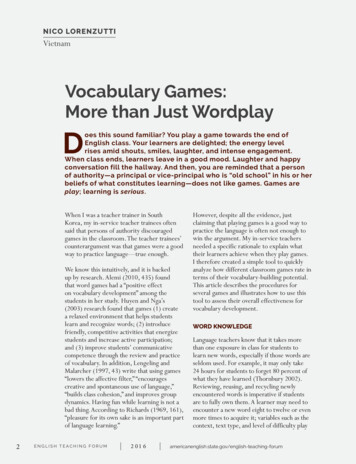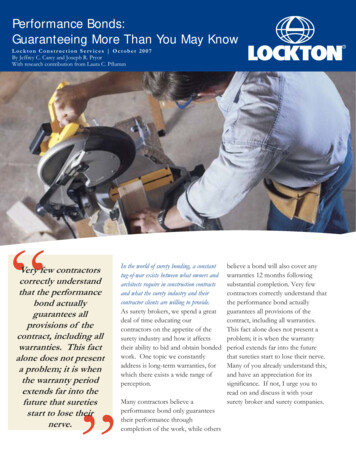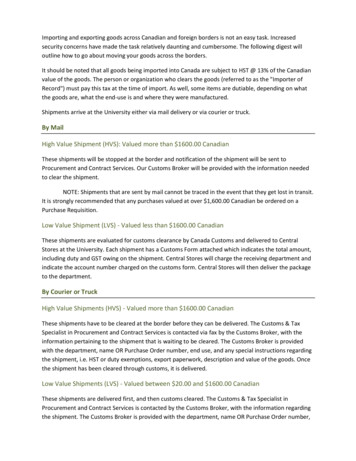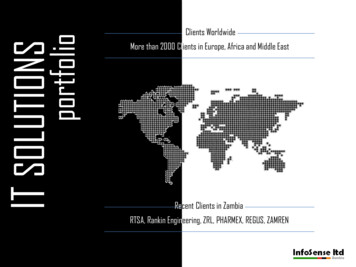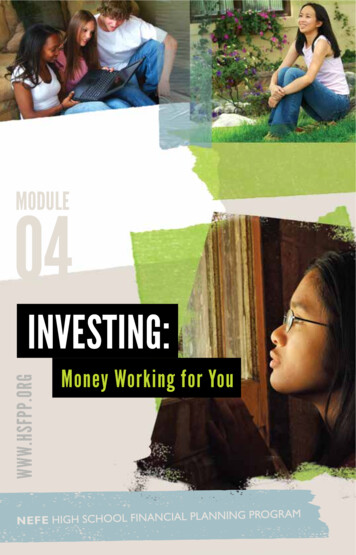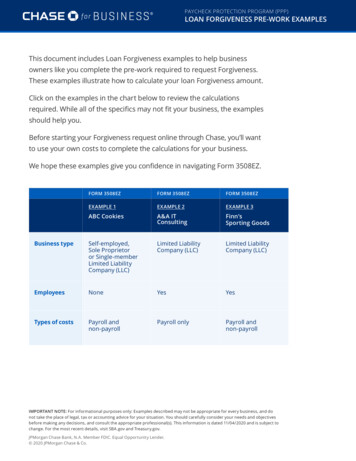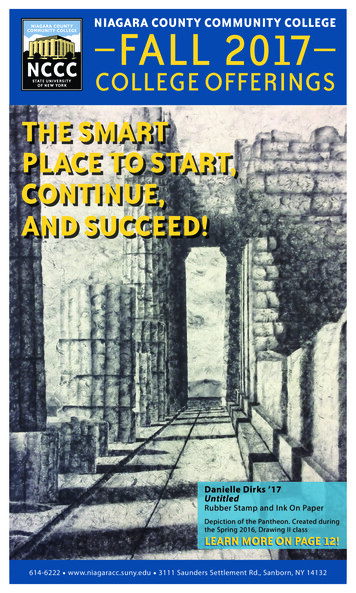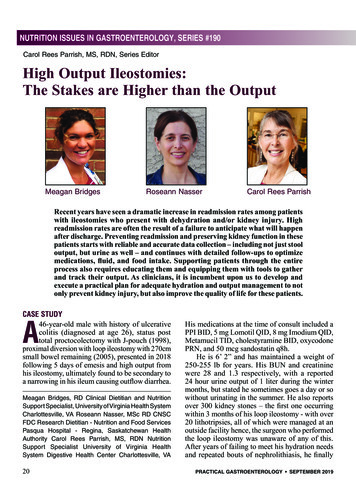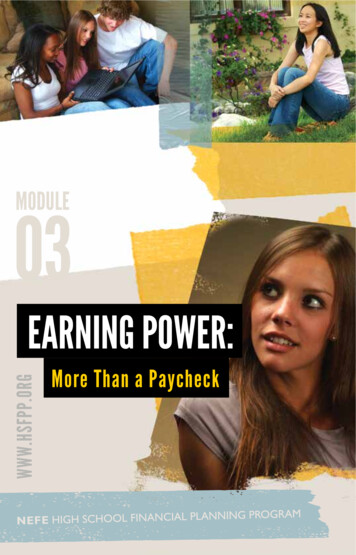
Transcription
Module03Earning Power:More Than a Paycheck
About the NEFE High School Financial Planning Program SeriesBy picking up this booklet, you are on your way to making your dreams cometrue and headed down the path to financial independence. This program seriesincludes six topic modules to introduce you to the fundamentals of mindfulmoney management behaviors. Use what you learn in each module todevelop sensible habits to confidently manage your money and adapt tounexpected events.Program Modules1. Money Management: Control Your Cash Flow: goal setting –decision making – spending plan & budget – money management tips2. Borrowing: Use—Don’t Abuse: application process – loans –credit cards – costs – credit score – debt – rights & responsibilities3. Earning Power: More Than a Paycheck: earning potential –career plan – life stages – employee benefits – take-home pay – lifestyle4. Investing: Money Working for You: savings – investing – goals –options – risks & rewards – time value of money – diversification – plan5. Financial Services: Care for Your Cash: account types – fees –service options – transaction tracking – automation – identity protection6. Insurance: Protect What You Have: risk management – costs –claims – insurance types – coverage decisions – insurability factorsFind more money management tips and resources at www.hsfpp.org. 2013, National Endowment for Financial Education (NEFE ). All rights reserved.This publication may only be used for instructional and educational purposes as part of the NEFE High SchoolFinancial Planning Program (HSFPP). No part of this publication may be copied, reproduced, modified, orcombined with other material. This publication may not be used for any commercial purpose, and no separate fee orconsideration may be charged in exchange for this publication or for participation in the NEFE HSFPP.NEFE provides the HSFPP as a public service to enhance the financial literacy of youth. The program does notpromote financial products, financial planning organizations, individuals, or companies. However, to be effectivelytaught, the program often makes use of outside volunteer financial services professionals to add value in a classroomor similar setting. While providing this service, outside financial services professionals are not permitted to sell,advertise, or otherwise in any way promote the particular financial services organizations or products with which theymay be affiliated.
Module03EARNING POWER:More Than a Paycheck
Table of ContentsMEET KEVIN AND GINA / page 3The Most Important Person in Your Financial Life / page 5INVEST IN YOUR SUCCESS / page 9THE DOLLARS AND CENTS OF EDUCATION / page 13SALARY AND BEYOND / page 21LIVING YOUR DREAM / page 30IN CASE OF DISASTER / page 36Adding it up / page 392E ARNING PO WER : M ore T han a P ayc h e c k
Use the tips and strategies in this guide to do the following:»» Explore the payoffs of investing in yourself.»» Evaluate career options and job offers.»» Assess factors that impact your personal income tax liabilityand take-home pay.»» Start down the path to achieving your financial goals and thelifestyle you want.»» Prepare to deal with planned and unplanned life and work changes.MEET KEVIN AND GINAAs a senior, Kevin works part-time ina restaurant and is thinking aboutcollege. He likes the idea of helpingsick people, and science has alwaysbeen his favorite subject. But he’snot sure yet what kind of career inmedicine he wants.He is worried about paying forcollege, though. His parents havesaved a small amount, but his sisterwill be ready for college the yearafter next.Gina loves cars and works in herUncle Frank’s auto repair shop.Sometimes, she even gets to helpher uncle on the pit crew for a localauto racer. Her mom recently asked her what she was thinking about in termsof college. Gina said maybe she’d go to college after working a few years in afull-time job for her uncle after graduating from high school.To lear n m ore, vis it www.hs fp p .org3
She wouldn’t say it to her mom, butGina doesn’t see how the family canafford for her to go to college. Moneyhas been tight since her dad passedaway two years ago. If she postponescollege, she can move out on her own;then maybe her mom will be ableto save enough money to send herbrother to college in a few years.“80 percent ofmillionaires were notborn wealthy—theybuilt their fortunethrough their ownhard work.” From The Millionaire Next Door,With the help of Kevin and Gina, we’llby T.J. Stanley and W.D. Dankoexplore how to maximize your futureearning potential so you can achieveyour dreams and live a life you enjoy.Working full time may seem eons away right now. But what you do today cangreatly expand or limit the options you’ll have for many years to come.Activity 3.1: What Do YOU Think?What type of life do you see yourself living the year after high school?Now, jump ahead a few years to your life at age 25. How will your life be different?Finally, what will your life be like when you’re the same age as your parentsare now?4E ARNING PO WER : M ore T han a P ayc h e c k
The Most Important Person in Your Financial LifeDo you have a giant list of things youwant to accomplish in your life? Thingsyou’d love to buy? A few bills you needto pay? For most people, a job is theonly way to afford the life they want.“The good news is that it doesn’t matterwho you are, how much money yourfamily has, or where you live. Everyonehas skills and talents they can make themost of in a career. And your earningpotential is 100 percent determinedby YOU.Without knowledgeand a workable plan,you are gambling,with little or nochance of success. Businessman Robert G. Allen”Don’t worry. No one expects you to have all the answers this very minute. Expertssay it takes about 10 years for young adults to go from clueless to having afulfilling job and career plan.1 But if you start now, you can be all set and on trackto your dream job by your late 20s!Create Your Game Plan for SuccessAs with anything in life, the more you know about where you want to go, theeasier it will be to get there. Creating a career plan will help you:»» Make smarter decisions about future jobs and education.»» Expand your career options instead of accidentally limiting them.»» Rebound faster when life throws you a curveball.»» Enjoy a long, happy, and successful career.The perfect time to begin researching careers and making your plan is while you’restill in school. The Bureau of Labor Statistics lists 1,000 job titles—and that’s justa fraction of what’s actually available in the working world. New occupations arebeing created all the time. The more potential careers you can explore, the morelikely you’ll be to find one that’s a good fit for your goals and life.1What Color is Your Parachute, Richard Bolles, 2012 (40th edition)To lear n m ore, vis it www.hs fp p .org5
The first step is simple: Start paying attention to whatinterests you and exploring how you might turn thatinto a career.Activity 3.2: My InterestsIn the space below, write words or draw pictures for 10 things that you like to doin your free time, in school, or on the job.Go to the American Job Center Network (jobcenter.usa.gov), a one-stopwebsite where you can take an interest assessment, explore careers, researcheducation opportunities, and plan a job search.After taking his grandmother to a doctor’s appointment one day, Kevin tellsher he’s surprised at how young her doctor is. She says that “Dr.” Wages isn’t herdoctor—he’s a physician assistant who started working with her doctor last year.Back home, Kevin searches for information on physician assistants. He’s excitedto see that the average salary is 88,660 a year and there is a growing demandfor workers in this career. He decides it’s definitely a career worth learningmore about.6E ARNING PO WER : M ore T han a P ayc h e c k
Get RealImagine that you’re interested in a summer job. You find out that your favoriteyogurt shop is looking for part-time help. But when you go there to apply forthe position, the manager tells you that you’re too late; the store already hashired someone. You really wanted that job, so you’re bummed.But what if you had looked into at least one other interesting place that wasadvertising for summer help?By having backup opportunities, you’ve also increased your chances offinding a job. There’s nothing wrong with following your passion. If youdream of being a rock star, pro football player, or astronaut, go for it!But it’s silly not to have a Plan B. Priorities change, injuries happen, andsometimes Plan A just doesn’t work out. By choosing a second career you’llenjoy, it will be much easier to handle any bumps in the road. You’ll alsodouble the odds of having a career that you find satisfying.Activity 3.3: Worth Checking OutReview your interests list from Activity 3.2 and the results of any career interestsurveys you have completed. Identify two careers you are interested in learningmore about. Choose one that represents your passion and one that might be agood fallback option, or Plan B.Plan A:Plan B:To lear n m ore, vis it www.hs fp p .org7
5 Ways Your Career Powerfully Impacts Your LifeYour career will be the longest adventure of your life. It’ll also be your primarysource of income. Choosing a rewarding career is important because your jobaffects every area of your life.Here’s how your life is impacted by your job:»» A job with a bigger salary helpsyou reach your financial goalsfaster and more easily, whilea smaller salary may force youto wait longer to achieve thelifestyle you want.»» The experience and skills youdevelop at each job affect yourfuture jobs and pay.»» How much you like your jobimpacts your health andhappiness. Unhappy workersare prone to a host of healthproblems, including twice theincidence of depression and a 30 percent higher risk of coronary heart disease,when compared with those who are happy with their work.2»» Your job also affects aspects of your lifestyle, such as how much time you’llhave for friends, family, and other interests.»» In addition, your job can impact how you manage your money. A regularpaycheck helps you stick to your spending plan. Unhappy workers are prone tooverspending when compared with their happy counterparts.3“Your Job May Be Killing You,” Gallup Management Journal, April 13, 2006, spx2“Your Money or Your Life,” Gallup Management Journal, May 27, 2010, gmj.gallup.com/content/127970/Money-Life.aspx#338E ARNING PO WER : M ore T han a P ayc h e c k
INVEST IN YOUR SUCCESSUncle Frank pulls Gina aside and tellsher he’d like to see her go to college.He explains that his brother, Gina’sdad, had always hoped to go tocollege himself but couldn’t becausehe was needed to help run the shopafter their own father got sick. Gina’suncle tells her that he’d hate to seeher miss out on the opportunity to goto college.“Invest in yourself. Yourcareer is the engine ofyour wealth.” Financial expert Paul ClitheroeUncle Frank says that if she’s truly interested in a career in auto repair, he’d like herto take the test to become a certified Automotive Service Consultant after shegraduates from high school.He goes on to say that after Gina gets certified, he’ll help pay for her communitycollege tuition while she continues working for him. Having someone with abusiness degree on board would definitely help when he expands the business.Besides, he adds, if Gina ever gets tired of auto repair, having a degree will give hermore options to fall back on.Your experience, education, skills, and abilities are unique. You can alwaysenhance them, but no one can ever take them away from you. They determinehow far you’ll go in your career, how much money you’ll make, and how many ofyour goals and dreams you actually achieve.Investing in yourself is the most importantinvestment you can make in your future wealthand happiness.The most valuable asset you have is YOU.To lear n m ore, vis it www.hs fp p .org9
As with any investment, you need essential details to make an informed decision.Doing your career-planning homework upfront can help save you from makingbad choices. Here are a few examples of how you can prepare:»» Research growth prospects for a potential career so you don’t pursue one thatno longer exists in a few years.»» Learn the types of education and skills that hiring managers value in a specificjob or industry so you can focus your efforts on the most important ones.»» Test drive a potential career so you don’t spend a fortune preparing for a careeryou quickly discover you hate.On top of that, decisions and goals you take on today will impact your futurecareer options and earning potential. This includes paying attention to thefollowing actions:»» Classes you choose to take»» Grades you earn»» Activities you are involved in, both in school and out of school»» Your plan to pay for an education after high schoolActivity 3.4: My Investment in MeList three ways that you have already invested in building skills and planning for ajob or career. How else can you invest in yourself over the next one to three years?Already Invested10E ARNING PO WER : M ore T han a P ayc h e c kNext Investment Strategies
A Lifetime of Education DividendsContinuing your education is your bestchance for securing a good job andmaking a good life for yourself. As shownin the chart, the government predicts thattwo-thirds of all jobs will require at leastsome college by 2018.4Jobs by RequiredEducation Level in 2018By 2018, about two-thirds of all jobs willrequire some college or higher. “Somecollege” includes professional certifications.But that doesn’t necessarily mean a fouryear college. Depending on the directionyou want to go, you may find other typesof education to be a better fit. And anyeducation beyond high school will helpboost your job opportunities andearning potential.Learning isn’t a one-time event. Investingin training and education throughoutyour career often can pay dividendsby improving your chances to earnpromotions. Keeping your skills up todate will also help you bounce back if youbecome unemployed.Luckily, there are education and trainingoptions to suit everyone.Beyond the Hallowed Halls of CollegeGina asks her Uncle Frank why he never went to college before his father got sick.He says his grades in high school were pretty lousy, but he’d always been goodwith cars. So, he decided to do an apprenticeship instead, which allowed him toearn money while learning the trade.Gina thinks the idea of an apprenticeship is interesting. She decides to askher school guidance counselor for help in finding information about any localautomotive apprenticeship programs.Help Wanted: Projections of Jobs and Education Requirements Through 2018, The Georgetown University Centeron Education and the Workforce, June 20104To lear n m ore, vis it www.hs fp p .org11
For many people, earning a bachelor’s degree in a general area of study makessense for their career aspirations. But if you want to start your career right away,can’t afford college, or aren’t ready to meet the college entrance requirements,there are many other education and training options.Any of the following options will give you theknowledge, skills, and credentials to advanceyour career and maximize your earning potential:Four-Year Colleges: Colleges and universitiesacross the country grant bachelor’s degrees forfour years of study in hundreds of subjects. Eachschool sets its own criteria for acceptance. Findout about a specific college by checking out thecollege’s website or use the college search featureat www.collegeboard.org.Two-Year Colleges: Community and junior colleges award associate degrees andcertificates for specific careers. For the period 2010 through 2018, occupationsrequiring an associate degree are projected to increase by 19 percent, more thanfor any other degree.5 The American Association of Community Colleges(www.aacc.nche.edu) is one place to find out more about these programs.Apprenticeships: Apprenticeship programs combine on-the-job training withclassroom instruction in a two- to four-year program. Over 1,000 occupations offerapprenticeships across the country. Learn more about program requirements atwww.doleta.gov/oa/apprentices.cfm and www.khake.com/page58.html.The U.S. Military: Thousands of jobs need to be filled in the U.S. military—and86 percent of them have a counterpart in the civilian world.6 While you are servingin the military, training for specific careers and skills is available at no cost.5Occupational Outlook Handbook, 2010-2011 Edition, Bureau of Labor Statistics6www.todaysmilitary.com12E ARNING PO WER : M ore T han a P ayc h e c k
Of the four options listed, are any a good match for you? Mark yourchoices with a star.THE DOLLARS AND CENTS OF EDUCATION“Knowledge is power. The more knowledge, expertise,and connections you have, the easier it is for you tomake a profit at the game of your choice.” Author Stuart WildeKevin decides to research the cost of different college options for hisundergraduate degree. He’s found that there are four categories for four-yearschools, each with a different price tag:The Cost of College in 20117Average Annual College Costs for Full-Time (Nonresident)Private(Nonprofit)Private(For Profit)Tuition and Fees 8,244 20,770 28,500 14,487Room and Board 8,887 8,887 10,089(Insufficient Data)Source: Trends in College Pricing 2011, College Board. Student populations in private for-profit schools consist mainlyof commuters and distance learners.7These numbers include things like tuition, a dorm room, meal plan, fees, andbooks. Living expenses—like gas and pizza—are extra. Although there’s a privateuniversity three hours away that Kevin would really like to attend, public in-statecolleges are definitely looking more affordable at this point.To lear n m ore, vis it www.hs fp p .org13
Public Vs. Private: What’s the Difference?A college’s funding won’t impact the quality of your education—public andprivate colleges both rank among the country’s best. But the portion offunding that is based on student fees will have a big impact on your finances.Since public colleges are supported by the state, they charge much lowertuition to residents of that state. That’s why going to a public college in yourhome state can be a less expensive option than attending an out-of-statepublic college or a privately funded institution.Activity 3.5: What is the Cost?You can find the anticipated annual college costs on college websites. Choosethree colleges—a private nonprofit college, an in-state public college, and anout-of-state public college. Compare the most current annual costs to live oncampus at each college.College TypePrivateIn-StateOut-of-StateCollege NameAnnual CostsAlthough continuing your education after high school has big benefits, it alsocan come with a big price tag. In fact, eight times as many students drop outof degree and certificate programs due to finances and debt than becauseof grades.8 So, planning to have enough money to cover college costs and livingexpenses is critical to your success.With Their Whole Lives Ahead of Them, 2009, Public Agenda, ality1. More than half of those who dropped out cited needing to work, another 31 percent said they couldn’t affordtuition. Only 10 percent dropped out because they found the classes too difficult.814E ARNING PO WER : M ore T han a P ayc h e c k
3 Costly College TrapsMany students seem to be taking the scenic route through college, with morethan half taking six years to graduate from a four-year college and only a quartergraduating from a two-year program within three years.9More years means more tuition, fees, and other expenses. It also increases theodds that you won’t finish. So, you still may end up with school loans to repay—but without getting
4. investing: Money working for you: savings – investing – goals – options – risks & rewards – time value of money – diversification – plan 5. FinanCial serviCes: Care for your Cash: account types – fees – service options – t


